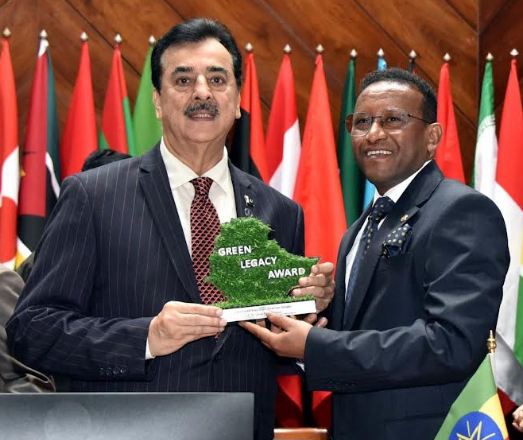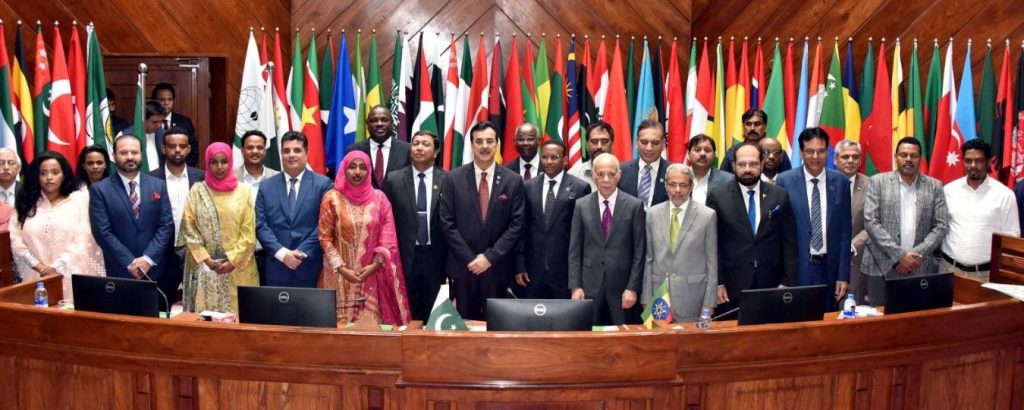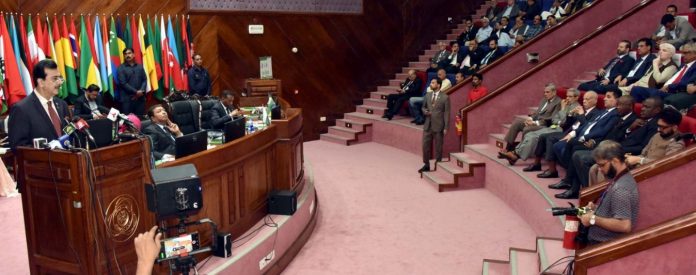ISLAMABAD, AUG 18 /DNA/ – Chairman Senate Syed Yousaf Raza Gilani has said that climate change is an urgent reality and despite contributing less than one percent to global emissions, Pakistan is among the most climate-affected countries, facing floods, glacial melt, and droughts.
He expressed these views while addressing the “Ethiopia–Pakistan Green Dialogue: Lessons from Ethiopia’s Green Legacy” at the COMSTECH Auditorium, Islamabad on Monday. The OIC Standing Committee on Scientific and Technological Cooperation (COMSTECH), in collaboration with the Embassy of the Federal Democratic Republic of Ethiopia, organized the dialogue.

He praised Ethiopia’s Green Legacy Initiative as a global model of reforestation and sustainability, noting that both nations face common challenges but can find solutions through South-South cooperation. He underlined Pakistan’s active role in global climate diplomacy, including championing the Loss and Damage Fund at COP27 and advancing climate finance at COP29.
Mr. Gilani called for practical collaboration through joint task forces, parliamentary exchanges, and research partnerships, while inviting Ethiopia’s parliamentary leadership to the upcoming Inter-Parliamentary Speakers’ Conference.

He informed the participants that landmark laws like the Pakistan Climate Change Act and National Energy Efficiency Act have been passed by the parliament. He urged the parliamentary committees actively monitor climate finance, adaptation plans, and carbon markets to ensure implementation.
He further stated that Pakistan’s Green Pakistan Programme, Living Indus Initiative, and Indus Delta Blue Carbon Project resonate with Ethiopia’s visionary Green Legacy Initiative. “If climate change is our greatest challenge, South-South cooperation is our most potent tool” Chairman Senate remarked. We face shared constraints—limited climate finance, exposure to extreme weather, and climate-dependent economies, he added. He observed that the way forward lies in coordinated efforts at the government, parliamentary and institutional levels. He called for maximizing linkages in legislative spheres, creating a Joint Task Force on Climate Resilience to coordinate policy and projects and strengthening linkages between academia and research institutes to exchange expertise. The Chairman Senate also invited the Ethiopia’s Parliamentary leadership to the ISC in Islamabad in November 2025.
He concluded: “Together, we can build a greener, safer, and sustainable future.”In his welcome remarks, Prof. Dr. M. Iqbal Choudhary, Coordinator General, OIC-COMSTECH, highlighted the importance of green diplomacy and collective action in tackling global challenges such as climate change, deforestation, and environmental degradation.
Ambassador Dr. Jemal Beker Abdula underlined Ethiopia’s remarkable achievements through the Green Legacy campaign, which has set an international benchmark for combating climate change through mass tree plantation and sustainable practices. Other distinguished speakers, including heads of delegations and guest dignitaries, emphasized the urgency of regional and global cooperation for sustainable development and climate action.
As part of the proceedings, Green Legacy Awards were presented, followed by a symbolic tree plantation ceremony and a group photograph, reflecting the shared commitment of Pakistan and Ethiopia towards a greener future.
A thought- provoking panel discussion on Green Legacy Initiatives brought together experts and policymakers who shared innovative strategies, policy frameworks, and community engagement models to promote long-term environmental sustainability.
The session concluded with a lively Q&A and networking lunch, where participants expressed strong support for further enhancing Pakistan–Ethiopia collaboration in climate resilience, ecological restoration, and sustainable development. The dialogue successfully underscored the shared vision of both countries in advancing environmental diplomacy and building a greener, sustainable future for generations to come.

















